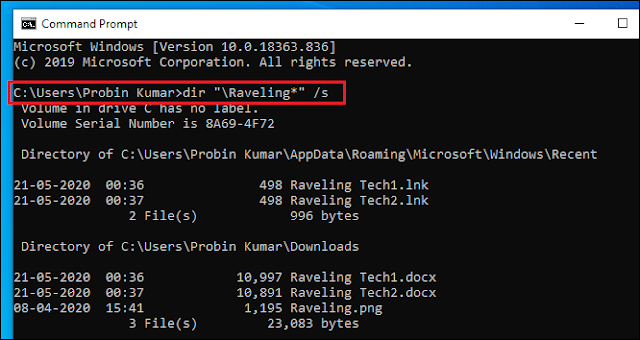
- WINDOWS 10 SEARCH ALL FILES FOR TEXT INSTALL
- WINDOWS 10 SEARCH ALL FILES FOR TEXT UPDATE
- WINDOWS 10 SEARCH ALL FILES FOR TEXT WINDOWS
Even if a file has multiple occurrences of the pattern, it’s printed only once by findstr. This command searches for the pattern in all *.log files, and then prints only the file names having the pattern. Print only the filenames finstr /M /C:"pattern" *.log You can add /N switch to the findstr command to print line numbers for the matched lines. Print line numbers for all the matched lines. Print only the lines where the given string is at the end of the line findstr /E /C:windows CLItips.txt You can add /B switch to indicate that the specified string should be in the beginning of the line. Print only the lines where the given string is at the beginning of the line. Adding ‘/M’ option to the command causes to print only the file names. You can customize the findstr command in the script to search in files with other extensions. The above command searches only text files. ‘pattern.txt ‘is the file having the strings(one per line) that need to be searched for. If you need to search for multiple strings, then you can do that with the below batch script.
WINDOWS 10 SEARCH ALL FILES FOR TEXT WINDOWS
To search all the text files in the directory C:\data: findstr /I windows C:\data\*.txt You can use wildcard ‘*” to specify that all the files in a directory should be searched for the given string.įor example, to search for ‘windows’ in all the files in the current directory, you can use the below command. findstr /R *xyz filename.txt Search for text in all the files in a current directory
WINDOWS 10 SEARCH ALL FILES FOR TEXT UPDATE
If you don’t see these options, you haven’t installed Windows 10’s May 2019 Update (that’s version 1903) yet. Or, from the search panel, click the menu button at the top right corner of the panel and select Indexing Options. Search for the occurrence of all words ending with ‘xyz’ in a file. To make your Start menu’s file search more reliable, you can now head to Settings > Search > Searching Windows. Here the pattern can be specified using regular expressions. You can use regular expressions with findstr /R switch. C indicates that the search pattern has to be matched literally.įor example, to search for the string “Apple Ball Cat” in file Book.txt, the command would be as below findstr /C:"Apple Ball Cat" Book.txt Search with Regular Expressions Search for pattern with multiple words findstr /C:"word1 word2 word3." filename This command would print a line if it has has either the word ‘Apple’ or the word ‘Orange’ or both the words. It saves me the severe mental anguish of having to hunt down a “known-good” bootstrap.ini file each time.Īnyway, I like Notepad++ well enough, and Don Ho seems to be a pretty nice guy, even though I was disappointed to learn that he doesn’t actually lead a double life, coding in Paris during the day and entertaining tourists in Hawaii at night.Findstr "word1 word2 word3." filename.txt findstr "Apple Orange" fruits.txt Whenever a new version of LibreOffice comes out, it’s really handy to open its bootstrap.ini file in Notepad++ and have a tab containing a previously revised bootstrap.ini file already loaded and ready to copy from.
WINDOWS 10 SEARCH ALL FILES FOR TEXT INSTALL
I install multiple versions of LibreOffice as “parallel” (~portable) installs but I have to manually edit each version’s bootstrap.ini file to point it to my LibreOffice user profile. Also, by default it restores the previous “session” of open tabs. I like pulling up XML files (which I do sometimes edit, e.g., for FreeFileSync) in Notepad++ because it does a nice job of coloring the tags and different nesting levels, resulting in fewer mistakes for an incipient Mr. I’m not a coder, so I don’t have much call for advanced functions in programs like Notepad++ and, accordingly, don’t go looking for them. Notepad++ returns all hits sorted by file and line afterwards.Īll that is left is to go through the results line by line to find what you are looking for (which I did not by the way, but that is another story). The search time depends largely on your selection, but should not take long. Last but not least, you may use the replace option to replace the text you entered with other text.Ĭlick find all to get started.

You may also enable match whole word or match case options, or switch from a normal search mode to an extended search mode or one that uses regular expressions. *.css or *.php, or file names, finance.* are included in the search. You can change filters, so that only certain file types, e.g. Optional parameters may be useful however. If you leave everything as is, Notepad++ will crawl all files of the selected root folder and all subfolders that it contains, and return all hits at the end of the search. Notepad++ searches all subfolders as well by default.Īll other fields are optional.


 0 kommentar(er)
0 kommentar(er)
